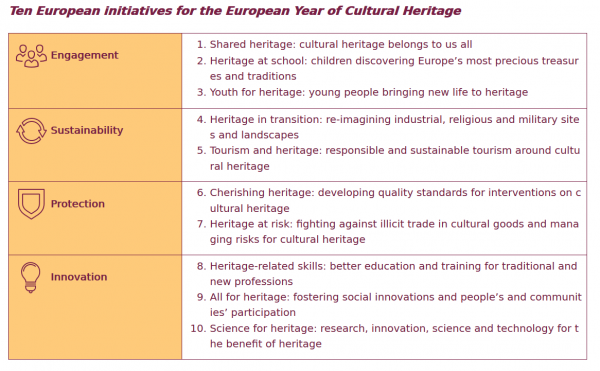On Thursday 7 December, the 2018 European Year of Cultural Heritage was launched at the European Culture Forum in Milan, Italy. The European Year of Cultural Heritage will put the spotlight on Europe's wealth of cultural heritage, showcasing its role in fostering a shared sense of identity and building the future of Europe.
The purpose is to raise awareness of the social and economic importance of cultural heritage. Thousands of initiatives and events across Europe will provide the possibility to involve citizens from all backgrounds. The aim is to reach out to the widest possible audience, in particular children and young people, local communities and people who are rarely in touch with culture, to promote a common sense of ownership.
From archaeological sites to contemporary architecture, from medieval castles to folklore traditions and arts, Europe's cultural heritage is at the very heart of the collective memory and identity of European citizens. In addition, cultural heritage creates growth and jobs in cities and regions and is central to Europe's exchanges with the rest of the world. 7.8 million jobs in the EU are indirectly linked to heritage (e.g. in tourism, interpretation and security). Over 300,000 people are employed in the EU cultural heritage sector, and with 453 inscribed sites, Europe as a region accounts for almost half of UNESCO's World Heritage List.
The launch coincided with the release of the new Eurobarometer survey on cultural heritage and its role in the perception of Europeans. According to the survey released today, 8 out of 10 Europeans think cultural heritage is not only important to them personally, but also to their community, region, country and the European Union as a whole. A large majority take pride in cultural heritage, whether it is located in their own region or country, or in another European country. More than 7 in 10 Europeans also agree that cultural heritage can improve their quality of life. The survey also shows that 9 in 10 think cultural heritage should be taught in schools. Three quarters of Europeans think primarily Member States and the EU should allocate more resources to protecting Europe's cultural heritage.
Especially at a time when cultural treasures are under threat and are being deliberately destroyed in conflict zones, the Commission considered that cultural heritage deserved a European Year in 2018. The Council and European Parliament Decision designating 2018 as the European Year of Cultural Heritage was adopted on 17 May 2017, based on the Commission's proposal of 30 August 2016.
The European Culture Forum, where the European Year of Cultural Heritage was launched, is a biennial flagship event organized by the European Commission. It raises the profile of European cultural cooperation, brings together the sector's key players, takes stock of the implementation of the European Agenda for Culture and fosters debate on EU culture policy and initiatives. In addition to the launch of the European Year of Cultural Heritage 2018, this year's Forum will reflect on culture's role in tackling European and global challenges as well as on the contribution of culture and creativity to local and regional socio-economic development.
To be involved and informed about the Year’s many activities and initiatives:
- Visit the website for updates and latest developments: http://europa.eu/cultural-heritage
- See what’s on! Find out about events taking place all around Europe: https://europa.eu/cultural-heritage/country-links
- Subscribe to the year’s newsletter to receive news and stories
- Follow the Year on www.facebook.com/CreativeEuropeEU and on Twitter: @europe_creative
- Share your views using the Year’s hashtag #EuropeForCulture
- Show your support and spread the message!



